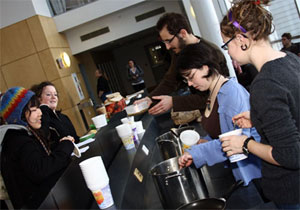 |
| On "Tuppy Thursdays," the student society SustainDal offers local, organic vegan food on campus; students can bring a container and cutlery with them to the McCain building at lunchtime to be served freshly made food, by donation. (Bruce Bottomley Photo) |
It’s true what they say about grades – you put in the work, you get the results.
HÂţ» showed significant improvement in its second year participating in the College Sustainability Report Card, going from a middling “C+” grade last year to a solid “B.” The survey graded more than 300 North American universities, making it the largest independent evaluation of campus sustainability activities at colleges and universities in the United States and Canada.
Rochelle Owen, director of HÂţ»â€™s Office of Sustainability, says the improved score reflects the work that Dal has put into becoming a more sustainable campus.Â
“I’d say that collectively we’ve made progress in different categories and are starting to make significant improvements,” she says, citing transportation – which went from a C to a B – as one major area of focus. “This year we did our sustainable transportation planning. We just launched our new bike centre in October. We’ve held focus groups on issues such as carpooling and we’re starting to pilot other programs as well. All of that effort makes a difference in the score.”
Another area of improvement in HÂţ»â€™s grade was student involvement, with the report citing such efforts as the DSU’s sustainability office, the student group SustainDal and the student staff employed by the university’s sustainability office.
 |
| Buildings under construction on campus, such as the new academic building on Coburg Road, will have many green features. |
What’s holding us back? Among Dal’s lowest grades was the “Climate Change & Energy” category. “Dal has done some energy work in the past, but the university is really ramping up with major planning on both fronts so we’re hoping to improve significantly in that category next year,” says Ms. Owen, citing major renovations to the Life Sciences Centre and a project to dramatically change the campus’ lighting infrastructure as notable initiatives.
“They’re huge issues to confront when you think about their impact, both ecologically and economically,” she continues. “How we interact with our buildings connects with everything from air quality, to health, to our budget. That file is key for us in the years to come.”
While achieving a good grade isn’t an end in and of itself, obviously, Ms. Owen says that she’s pleased that Dal’s efforts are being recognized and hopes the higher score only encourages the university to aim higher when it comes to campus sustainability. To that end, her office is launching a “ReThink” campaign – a sustainability awareness competition that begins on Friday, October 23 with a public event in the Student Union Building at noon.
HÂţ» was one of 17 Canadian universities to take part in the report card this year; of those, nine – including Dal – posted improved marks over last year. No Canadian school earned a grade higher than a B+.
You can read HÂţ»â€™s evaluation at: . To read the entire report card, visit:
